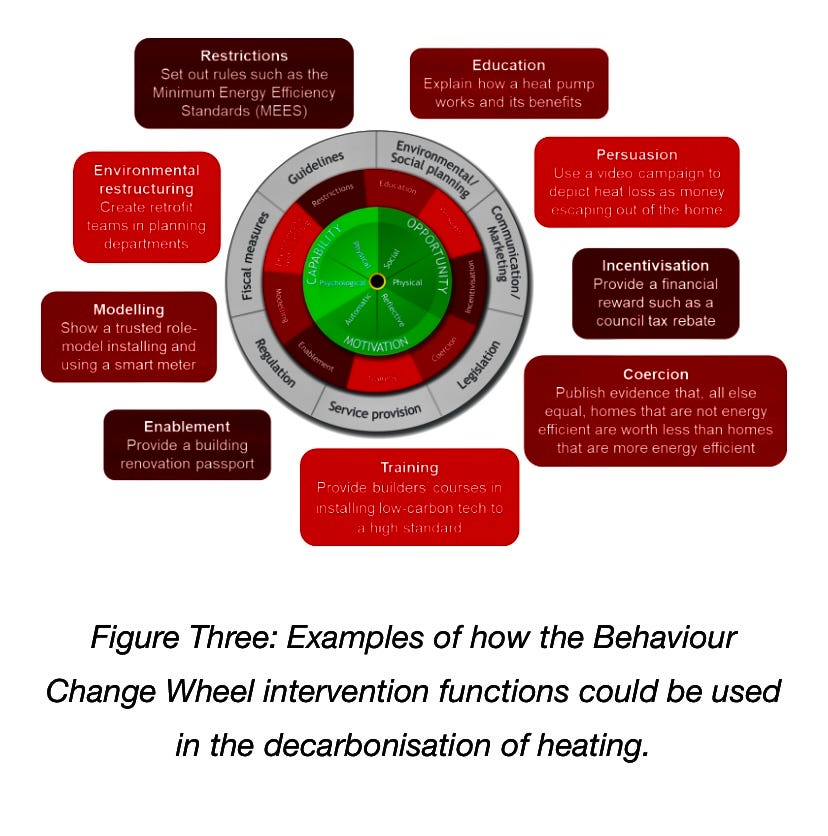Behavioural Science Unit? Nudge, nudge - we see you...
How Welsh Government intends to create 'Climate Compliance'.
Most of you will no doubt be aware of the Behavioural Insights Team (also known as the Nudge Unit) and of how our government has been attempting to manipulate behaviour change since 2010. Welsh Government has also been working on behavioural nudge techniques so I thought I would share some of the tactics you will no doubt be subjected to in light of the ‘Climate Emergency’ declared by them in 2019.
Public Health Wales has a collaboration with the World Health Organisation (the only public health service in the UK to do so). There is now a Behavioural Science Unit – launched in May 2022 - within the International Health Coordination Centre and they have published a document titled,
‘Responding to the Climate Crisis: Applying Behavioural Science’. This document is a guide for professionals working on policy, service or communications to tackle the ‘climate crisis’.
Stated within is the following sentence:
‘Climate Change is regarded by the WHO as the single biggest health threat facing humanity’.
This is followed by the acronym ACT NOW, broken down into the following headings:
Assemble the immediate benefits i.e. make it matter now. This includes focusing upon ‘co-benefits’ such as physical benefits from changing diets and cost savings.
Commitments and planning – obtaining commitments and planning the change e.g. pledging to change behaviour on social media.
Tackle habits – because ‘habits can prevent the adoption of new positive climate behaviour’.Positive climate behaviours must be NEAR (Normal, Easy, Attractive and Routine – more of this further on). Duke University academics discovered that 40% of daily behaviour is habit. The guide mentions that many climate-impacting behaviours have become ingrained habits and gives examples as commuting, waste disposal and shopping!
Never forget COM-B – this is the model for behaviour change which focuses on three components for behaviour change - Capability, Opportunity and Motivation.
Optimistic and relatable actions – this is all about positive language and ensuring that interventions about climate change are all about the target audience and ‘people like them’. Here it states, ‘Climate change is dire – but the way we talk about it doesn’t have to be’. Messaging needs to be direct and it helps if it is personalised e.g. seeing our name in a message. This apparently helps ‘reduce the perceived psychological distance of climate change impacts’.
Window of opportunity – these arise for more effective climate change-related behaviour change during transitional periods such as moving house, changing jobs and ‘extreme events’. Extreme events? Rather like Covid, when Klaus Schwab stated that it presented a ‘rare but narrow window of opportunity to reflect, reimagine and reset our world’.
The NEAR mnemonic mentioned in the tackling habits point (above) stands for:-
Normal e.g. menus with vegetarian sections incorporated rather than separate.
Easy e.g. defaulting customers onto a renewable energy tariff.
Attractive e.g. an incentive scheme in the Netherlands for e-bike use rather than car saw an increase in the share of commute trips by e-bike.
Routine e.g. banning plastic bags in Kenya. The reusable bag became the norm within days, not decades.
The Behaviour Change Wheel, a framework of behaviour change devised by communist Professor Susan Michie is referenced and certain criteria, namely APEASE (yet another acronym) must be used throughout the nudging process:
Acceptability e.g. legislation to completely ban the use of log burners may not be acceptable to those who own them.
Practicability.
Effectiveness e.g. will focusing upon active travel achieve significant emission reduction?
Affordability
Spill-over effects e.g. will policies to make vegan meals compulsory for health organisation events lead to increased importation of ingredients with high carbon footprints?
Equity e.g. will focusing upon e-vehicles increase health inequities given that people from more deprived areas may not afford the switch?
Yet more collaboration has been described in a blog post by University College London’s Centre for Behavioural Change. In this, the CBC Deputy Director Dr Paul Chadwick and Senior Research Associate Dr Jo Hale share ‘key insights’ for decarbonising the 1.5 million homes in Wales, learned through working with the Decarbonisation of Homes in Wales Independent Advisory Group. (See my previous Substack on this subject).
In the COM-B section it mentions that there is a ‘high visibility of anthropogenic climate change deniers within mainstream and social media’. It also states under the ‘motivation’ section that ‘homeowners will not recover the costs of installation for most low carbon technologies via energy savings’.
The infographic included is rather eye opening as it gives interesting examples of future tactics:
Incentivisation e.g. provide a financial reward such as a council tax rebate.
Persuasion e.g. use a video campaign to depict heat loss as money escaping out of the home.
Coercion e.g. publish evidence that, all else equal, homes that are not energy efficient are worth less than homes that are energy efficient.
Pembrokeshire Council’s Climate Action Plan – thanks to my eagle-eyed friend - even suggests incentivising more sustainable forms of travel. For example, one day’s extra annual leave to be given when an employee takes the train to Europe rather than the plane, or when choosing to holiday in the UK rather than abroad.
Expect a level of unprecedented psychological terrorism in the run up to 2030. As seen in my tweet recently, from 2026-2030 the Welsh Government’s Routemap in the Net Zero Carbon status by 2030 envisages public sector ‘staff and citizens demand zero tolerance of unsustainable behaviour as it is socially unacceptable’.
.


Funny how they have to coerce people into seeing what they claim is the biggest threat to humanity ever.
Brilliant, Nicola. Thanks for writing this. Have shared it. x